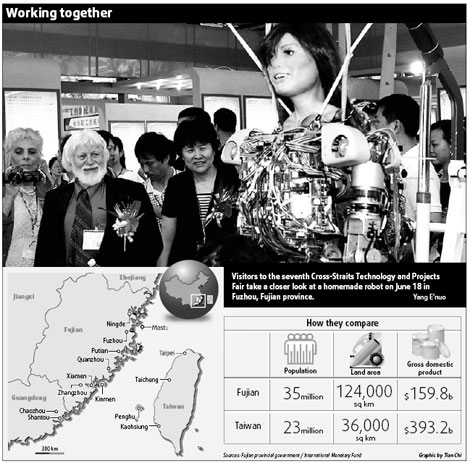Walking through the naval bases along the coast of Fujian, the mainland province closest to Taiwan, it is still possible to read some old, fading slogans painted on rocks and the sides of buildings extolling the need to remain vigilant against "secrets leaking from your lips".
They are a remnant of the late 1980s, when relations across the Straits were at a low point.
"The only reason they are still there is because they have not been painted over in recent years," explained Chen Yonglin, a regimental officer at Fujian naval base in Ningde.
In many areas of the haixi region, which includes Fujian and parts of Zhejiang, Guangdong and Jiangxi provinces, these slogans have already been erased and replaced with new messages, ones that speak of peace and cooperation.
Haixi, which translates as "west bank of the Taiwan Straits", is a top priority for the government, especially in Fujian where, due to its mountainous landscape and proximity to Taiwan, economic development has been slower than its coastal neighbors.
In May, the State Council approved plans to support the setting up of a haixi economic zone (HEZ), a project championed by the provincial authorities in Fujian since 2004. The nation's cabinet said in a recent document: "The major positive changes that have taken place in the cross-Straits relationship have provided significant opportunities for boosting the development of the HEZ."
Experts hailed the move as one that will transform the province from a frontline into a base for advancing cross-Straits exchanges and cooperation.
Huang Jiehui, 60, started his orchid business in Zhangzhou, a city in southern Fujian, in 2005, when the mainland and Taiwan established a pioneering agricultural cooperation trial.
His ancestors have lived in Taiwan for several generations, but originated from Fujian.
"I could still feel the blood tie with Fujian," he told China Daily. "I feel comfortable here. It's close to Taiwan, and similar to Taiwan. Taiwan was called the 'kingdom of orchids' for its production and sales volume. It also it has an obvious advantage in seed breeding."
But he explained the industry is gradually shifting to the mainland, mainly because the market is bigger and production costs are cheaper.

Huang takes orchid seeds from Taiwan to plant in Zhangzhou. It takes him less than five hours to make the round trip, via a boat ride and short flight, and this year he expanded his orchid garden to three times its original size. He is now preparing to retire and let his son, who is in his 20s, take over the business. "My forefathers lived here, so it's only natural my family has returned," he added.
It is believed 80 percent of Taiwan natives can trace their families back to Fujian.
Following the end of China's civil war in 1949, shipping channels, flights and postal services across the Taiwan Straits were diverted through Hong Kong or Macao.
Last year, however, residents from both sides were given the green light to exchange visits.
A 30-minute boat ride is all that separates the two and, in Kinmen, tourists can board a flight to other areas of Taiwan.
It has seen cross-Straits tourism soar, with boats to Kinmen carrying more than 3,000 passengers every day, while sightseers from both sides can also charter private vessels at will to cross the Straits.
Mainland travel agents welcomed almost 40,000 Taiwanese from January to May, while their counterparts across the water entertained more than 35,000 mainlanders.
The most popular souvenirs for tourists in Xiamen are said to be candies, while those who visit Kinmen often snap up kitchen knives made from old bombs shells.
By April this year, Fujian had six passenger ship routes and 12 cargo ship routes to Taiwan's Kinmen, Matsu and Penghu ports, transporting 4.2 million people and 6 million tons of goods, said the provincial Taiwan Affairs Office.
In Quanzhou, another coastal city, the biggest mainland petrochemical industrial park exclusively for Taiwan enterprises is under construction.
"Taiwan businessmen started to contact us in 2001 about investing. But they all decided it was too risky at that time, when the cross-Straits situation was still delicate," said You Zuyong, Party secretary for the city's Quangang district, where the park will be built.
"It would be hard to imagine the situation if they were not in Fujian then. There were military maneuvers and the armed forces were constantly being reallocated to different parts of the coastline."

Just two weeks after the State Council approved the HEZ plan to boost development of the Haixi region, eight leading Taiwan-based petrochemical firms met with the Quanzhou municipal government to sign a $6-billion framework agreement for the park.
The petrochemicals industry has matured in Taiwan but it has also been saturated. In Fujian there are opportunities to expand, thanks to the area's abundance of space and links to a large hinterland, said You.
By April, Taiwan companies had invested more than $20 billion in Fujian industries, including electronics, manufacturing and petrochemicals.
It became the biggest import market and the mainland province's fourth largest trading partner last year, and has launched pilot projects in the fields of finance, medicine and harbor management.
In the early 1980s, Fujian's economy was just 2.5 percent the size of Taiwan's. Today it stands at 40 percent. This year, the province has also completed a five-year project to build an extensive highway network and launch four new railway lines.
"The future for Fujian holds not only the HEZ, but also a Taiwan Straits economic zone," said Zheng Ming, professor of Xiamen University.
China has the world's third largest economy and experts expect it to surpass second-placed Japan in the next few years. Lu Zhangong, Fujian's Party secretary, said: "If it continues improving as it has been doing, Fujian's economy will surpass Taiwan's in the future." |

